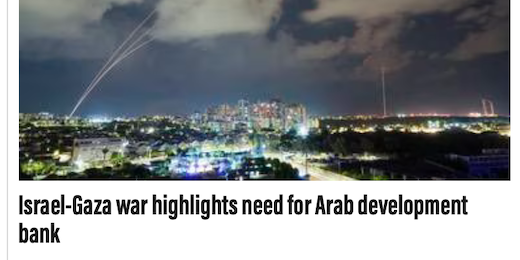The article titled “Arab world needs a regional development bank as it continues to tally the cost of war” appeared in the print edition of The National on 26th October 2023 and is posted below.
Arab world needs a regional development bank as it continues to tally the cost of war
Focus needed on post-war stabilisation, recovery and reconstruction and the pre-war economic legacy
Nasser Saidi
We are in the third week of the Israel-Gaza war with a growing risk of it becoming yet another drawn-out battle that will leave severe economic scars.
This and previous wars mean horrendous loss of life and human capital, forced migration and displacement, destruction of infrastructure, housing, businesses and productive capacity, of cuts to public utilities, water, power, fuel – all threatening the survival of the remaining population. Overpopulated Gaza is already “de-developed” and deconstructed.
The International Monetary Fund’s September report on Gaza highlighted the calamitous situation in the enclave before the current war. Gaza’s real gross domestic product growth averaged just 0.4 per cent during 2007-22, with real GDP per capita declining at an annual average rate of 2.5 per cent.
By 2022, per capita income in the West Bank was four times higher than in Gaza, reflecting the blockade and recurrent wars resulting in little trade and investment. Unemployment was as high at 45 per cent in 2022 and 53 per cent of the population lived below the poverty line.
Reconstruction was one of the only “growth” sectors: in 2022, between $345 million and $485 million was required for immediate and short-term recovery and reconstruction needs in Gaza.
Israel’s policy of economic warfare against Gaza has been very costly.
:quality(70)/cloudfront-eu-central-1.images.arcpublishing.com/thenational/GVEOMDUA3NCOJGYQNRP5QIY52M.png)
Will the current war engulf Lebanon, Syria, Iran, Iraq and the Gulf? We don’t know yet.
Past wars have disfigured the Middle East. Beyond the human cost and war-related destruction of physical assets, war-affected countries witnessed a sharp contraction in economic activity, as well as fiscal, current account and balance of payments deficits, currency crises and high inflation.
:quality(70)/cloudfront-eu-central-1.images.arcpublishing.com/thenational/AH6WTMLMQFGCFB64KPD66E2J7Q.png)
They also faced sector-specific collapses – tourism, trade, manufacturing, weaker financial systems – along with a diversion of resources to the military and build-up of military assets at the expense of economic and social development.
Wars result in large-scale displacement of populations and forced migration, with the Mena region already hosting (end-2022) about 2.4 million refugees, in addition to about 12.6 million internally displaced persons, according to the UN refugee agency.
More displacement will put severe strain on the hosting nations’ budgets and finances as well as their socioeconomic-political stability.
A collapse in investor confidence in the conflict and neighbouring nations results in lower domestic and foreign direct investment flows. An estimate of the opportunity costs in financial, economic, social, political, military, environmental and diplomatic terms for the entire region for the period 1991-2015 is a staggering $15 trillion.
With the global economy tentatively recovering from the aftermath of the Covid-19 pandemic, the Russia-Ukraine war, high inflation and slow growth, the continuing war generates greater global geo-eco-political risk and uncertainty.
Global markets have already reacted. Safe-haven assets, including the dollar and gold, gained, while credit default swaps on Middle Eastern nations’ debt (including Saudi Arabia and Qatar) have spiked.
The current surge in oil prices could accelerate with a further escalation or broadening of the war, with the Middle East accounting for more than one third of the world’s seaborne oil trade and the Suez Canal about 15 per cent of world trade.
An oil and commodity shock resulting from the likely disruption in transport and logistics would cut growth and raise inflation rates. A scenario emerges of continued monetary policy tightening by central banks, slower credit growth (affecting both households and businesses alike), increased refinancing risks and, potentially, debt crises or defaults and a global recession.
The future is clouded by the fog of war. A priority is to address humanitarian concerns: amid the massive human toll, Gaza’s citizens run the risk of starvation and the spreading of diseases without access to water, food, health care and electricity.
We need to go beyond, to postwar stabilisation, recovery and reconstruction from the destruction wrought by the war and prewar economic legacy. It took 20 years after the Lebanese civil war for real GDP to recover to its prewar level, seven years in Kuwait after the Gulf War.
In the case of Gaza, there is still no consensus what a postwar Gaza would look like. With its economy intrinsically tied to Israel, and the lack of its own (or stand-alone) fiscal, financial or infrastructure resources begs the question of how postwar recovery would be undertaken.
This is a time to develop a new vision for the Mena region. In a multipolar world, the Arab world needs to take the initiative to set up an Arab Bank for Reconstruction and Development (ABRD), backed by the GCC.
Unlike other regions, Mena lacks a regional development bank. This is the historic moment to set up the ABRD given the need for reconstructing places already devastated by war and violence, such as Palestine, Iraq, Syria, Lebanon, Libya, Sudan and Yemen.
The ABRD would be set up by the region’s sovereign wealth funds and existing development funds.
Prior to the latest Israel-Gaza war, a rough estimate of the cost of development and reconstruction of the region’s countries destroyed by war and violence was upwards of $1.5 trillion, to which must be added the massive costs of reconstructing Gaza.






